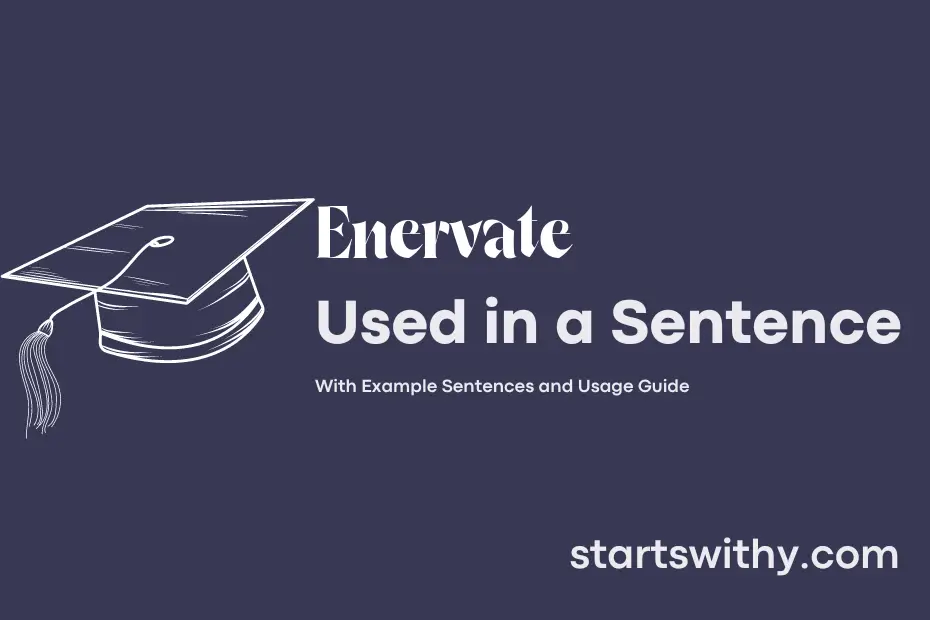Feeling drained or lacking in energy? The word “enervate” might be just the term to describe that state of fatigue. Enervate, a verb of Latin origin, means to weaken or exhaust.
When you experience situations that leave you feeling depleted or sapped of vitality, you can use “enervate” to convey that feeling. It captures the essence of being drained or lacking energy, painting a vivid picture of the fatigue or weariness you may be experiencing.
7 Examples Of Enervate Used In a Sentence For Kids
- The hot sun can enervate you.
- Eating healthy food can help you feel strong and not enervated.
- Playing outside in the fresh air can make you feel energetic and not enervated.
- Drinking water can help you stay hydrated and not feel enervated.
- Taking a nap can help you relax and not feel enervated.
- I love to dance because it makes me feel happy and not enervated.
- Getting enough sleep at night can keep you from feeling enervated during the day.
14 Sentences with Enervate Examples
- Enervate by the hot weather, the students struggled to concentrate in their stuffy classrooms.
- The never-ending assignments and exams enervated the college students, leaving them exhausted and stressed.
- The constant noise and distractions in the library enervated Emily, making it hard for her to focus on her studies.
- The lack of proper sleep and unhealthy diet choices enervated Rohan, affecting his performance in exams.
- Long hours of commuting to college enervated Priya, leaving her drained before she even reached her classes.
- The slow internet connection on campus enervated the students trying to submit their assignments online.
- The strict deadlines for assignments and projects enervated the students, leaving them scrambling to complete their work.
- The limited resources in the college library enervated the students, hindering their research for academic projects.
- The peer pressure and high expectations from family enervated Raj, leading to anxiety and burnout.
- The competitive atmosphere in college often enervated Aashi, making her question her own abilities.
- The constant group study sessions enervated Aditya, as he found it hard to stay motivated and productive.
- The lack of extracurricular activities enervated Sonali, leaving her feeling isolated and unfulfilled in college.
- The frequent power outages on campus enervated the students who were trying to prepare for upcoming exams.
- The noise from construction work near the hostel enervated the residents, disrupting their peace and relaxation.
How To Use Enervate in Sentences?
Enervate is a word that refers to making someone feel drained of energy or vitality. It is important to use Enervate correctly in a sentence to convey the intended meaning. Here’s a guide for beginners on how to use Enervate effectively:
-
Choose the right context: Make sure to use Enervate in situations where you want to describe someone or something as feeling exhausted, weakened, or lacking energy.
-
Use it in a sentence: For example, you could say, “The long, stressful day at work completely enervated him, leaving him feeling utterly drained.”
-
Pay attention to word placement: It is important to place Enervate in the appropriate part of the sentence to ensure clarity. You can use it as a verb to describe an action, like in the sentence mentioned above.
-
Consider the tone: Enervate is a formal word, so make sure to use it in appropriate settings, such as in academic writing, professional emails, or formal speeches.
-
Practice using the word: To become more comfortable with using Enervate, try incorporating it into your writing or conversations. This will help you become more confident in using the word accurately.
Remember, using Enervate correctly can enhance your communication skills and help you express yourself more precisely and effectively.
Conclusion
In conclusion, the use of sentences with “enervate” demonstrates a clear understanding of how to convey feelings of weakness, fatigue, or lack of energy in writing. The word adds depth and specificity to descriptions of physical or emotional states, making the writing more vivid and engaging. By incorporating “enervate” into sentences, writers can create a more nuanced and impactful narrative that effectively communicates the desired mood or atmosphere to the reader.
Overall, sentences containing “enervate” serve as powerful tools for enhancing the tone and imagery of a text, allowing writers to skillfully depict moments of exhaustion, depletion, or demoralization. Whether used in fiction, poetry, or non-fiction writing, the strategic inclusion of this word can contribute to a more evocative and compelling storytelling experience, capturing the subtle nuances of the human experience with precision and eloquence.



